- Home
- Daniel Defoe
History of the Plague in London
History of the Plague in London Read online
Produced by Bethanne M. Simms, Louise Pryor and the OnlineDistributed Proofreading Team at https://www.pgdp.net
ECLECTIC ENGLISH CLASSICS
HISTORYOFTHE PLAGUE IN LONDON
BYDANIEL DEFOE
NEW YORK .:. CINCINNATI .:. CHICAGOAMERICAN BOOK COMPANY
Copyright, 1894, byAMERICAN BOOK COMPANY.
DEFOE--THE PLAGUE IN LONDON.M. 2
PRINCIPAL WARDS AND PARISHES IN THE CITY OF LONDON,1665.]
LONDON AND THE SUBURBS, SEVENTEENTH CENTURY.]
INTRODUCTION.
The father of Daniel Defoe was a butcher in the parish of St. Giles's,Cripplegate, London. In this parish, probably, Daniel Defoe was born in1661, the year after the restoration of Charles II. The boy's parentswished him to become a dissenting minister, and so intrusted hiseducation to a Mr. Morton who kept an academy for the training ofnonconformist divines. How long Defoe staid at this school is not known.He seems to think himself that he staid there long enough to become agood scholar; for he declares that the pupils were "made masters of theEnglish tongue, and more of them excelled in that particular than of anyschool at that time." If this statement be true, we can only say thatthe other schools must have been very bad indeed. Defoe never acquired areally good style, and can in no true sense be called a "master of theEnglish tongue."
Nature had gifted Defoe with untiring energy, a keen taste for publicaffairs, and a special aptitude for chicanery and intrigue. These werenot qualities likely to advance him in the ministry, and he wiselyrefused to adopt that profession. With a young man's love for adventureand a dissenter's hatred for Roman Catholicism, he took part in the Dukeof Monmouth's rebellion (1685) against James II. More fortunate thanthree of his fellow students, who were executed for their share in thisaffair, Defoe escaped the hue and cry that followed the battle ofSedgemoor, and after some months' concealment set up as a wholesalemerchant in Cornhill. When James II. was deposed in 1688, and theProtestant William of Orange elected to the English throne, Defoehastened to give in his allegiance to the new dynasty. In 1691 hepublished his first pamphlet, "A New Discovery of an Old Intrigue, aSatire leveled at Treachery and Ambition." This is written in miserabledoggerel verse. That Defoe should have mistaken it for poetry, andshould have prided himself upon it accordingly, is only a proof of howincompetent an author is to pass judgment upon what is good and what isbad in his own work.
In 1692 Defoe failed in business, probably from too much attention topolitics, which were now beginning to engross more and more of his timeand thoughts. His political attitude is clearly defined in the title ofhis next pamphlet, "The Englishman's Choice and True Interest: in theVigorous Prosecution of the War against France, and serving K. Williamand Q. Mary, and acknowledging their Right." "K. William" was too astutea manager to neglect a writer who showed the capacity to become adangerous opponent. Defoe was accordingly given the place of accountantto the commissioners of the glass duty (1694). From this time untilWilliam's death (1702), he had no more loyal and active servant thanDefoe. Innumerable pamphlets bear tribute to his devotion to the Kingand his policy,--pamphlets written in an easy, swinging, good-naturedstyle, with little imagination and less passion; pamphlets whoseprincipal arguments are based upon a reasonable self-interest, and forthe comprehension of which no more intellectual power is called for thanProvidence has doled out to the average citizen. Had Defoe lived in thenineteenth century, instead of in the seventeenth, he would havecommanded a princely salary as writer for the Sunday newspaper, and ascomposer of campaign documents and of speeches for members of the Houseof Representatives.
In 1701 Defoe published his "True-born Englishman," a satire upon theEnglish people for their stupid opposition to the continental policy ofthe King. This is the only metrical composition of prolific Daniel thathas any pretensions to be called a poem. It contains some lines notunworthy to rank with those of Dryden at his second-best. For instance,the opening:--
"Wherever God erects a house of prayer, The Devil always builds a chapel there; And 'twill be found upon examination The latter has the largest congregation."
Or, again, this keen and spirited description of the origin of theEnglish race:--
"These are the heroes that despise the Dutch, And rail at newcome foreigners so much, Forgetting that themselves are all derived From the most scoundrel race that ever lived; A horrid crowd of rambling thieves and drones, Who ransacked kingdoms and dispeopled towns: The Pict and painted Briton, treach'rous Scot By hunger, theft, and rapine hither brought; Norwegian pirates, buccaneering Danes, Whose red-haired offspring everywhere remains: Who, joined with Norman French, compound the breed From whence your true-born Englishmen proceed."
Strange to say, the English people were so pleased with this humoroussketch of themselves, that they bought eighty thousand copies of thework. Not often is a truth teller so rewarded.
Not unnaturally elated by the success of this experiment, the next yearDefoe came out with his famous "Shortest Way with the Dissenters," asatire upon those furious High Churchmen and Tories, who would devourthe dissenters tooth and nail. Unfortunately, the author hadoverestimated the capacity of the average Tory to see through a stonewall. The irony was mistaken for sincerity, and quoted approvingly bythose whom it was intended to satirize. When the truth dawned throughthe obscuration of the Tories' intellect, they were naturally enraged.They had influence enough to have Defoe arrested, and confined inNewgate for some eighteen months. He was also compelled to stand in thepillory for three days; but it is not true that his ears were cropped,as Pope intimates in his
"Earless on high stood unabashed Defoe."
What are the exact terms Defoe made with the ministry, and on exactlywhat conditions he was released from Newgate, have not been ascertained.It is certain he never ceased to write, even while in prison, bothanonymously and under his own name. For some years, in addition topamphlet after pamphlet, he published a newspaper which he called the"Review,"[1] in which he generally sided with the moderate Whigs,advocated earnestly the union with Scotland, and gave the English peoplea vast deal of good advice upon foreign policy and domestic trade. Thereis no doubt that during this time he was in the secret service of thegovernment. When the Tories displaced the Whigs in 1710, he managed tokeep his post, and took his "Review" over to the support of the newmasters, justifying his turncoating by a disingenuous plea of preferringcountry to party. His pamphleteering pen was now as active in theservice of the Tory prime minister Harley as it had been in that of theWhig Godolphin. The party of the latter rightly regarded him as atraitor to their cause, and secured an order from the Court of Queen'sBench, directing the attorney-general to prosecute Defoe for certainpamphlets, which they declared were directed against the Hanoveriansuccession. Before the trial took place, Harley, at whose instigationthe pamphlets had been written, secured his henchman a royal pardon.
When the Tories fell from power at the death of Queen Anne (1714), andthe Whigs again obtained possession of the government, only one of twocourses was open to Defoe: he must either retire permanently frompolitics, or again change sides. He unhesitatingly chose the latter. Buthis political reputation had now sunk so low, that no party could affordthe disgrace of his open support. He was accordingly employed as aliterary and political spy, ostensibly opposing the government, worminghimself into the confidence of Tory editors and politicians, using hisinfluence as an editorial writer to suppress items obnoxious to thegovernment, and suggesting the timely prosecution of such critics as hecould not control. He was able to play this double part for eight years,until his treachery was discovered by one Mist, whose "Journal" Defoehad, in his own words, "disabled and enervated
, so as to do no mischief,or give any offense to the government." Mist hastened to discloseDefoe's real character to his fellow newspaper proprietors; and in 1726we find the good Daniel sorrowfully complaining, "I had not published myproject in this pamphlet, could I have got it inserted in any of thejournals without feeing the journalists or publishers.... I have notonly had the mortification to find what I sent rejected, but to lose myoriginals, not having taken copies of what I wrote."[2] Heavy-footedjustice had at last overtaken the arch liar of his age.
Of the two hundred and fifty odd books and pamphlets written by Defoe,it may fairly be said that only two--"Robinson Crusoe" and the "Historyof the Plague in London"--are read by any but the special students ofeighteenth-century literature. The latter will be discussed in anotherpart of this Introduction. Of the former it may be

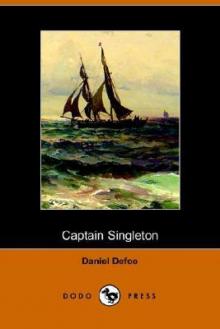 Captain Singleton
Captain Singleton An Essay Upon Projects
An Essay Upon Projects Moll Flanders Moll Flanders Moll Flanders
Moll Flanders Moll Flanders Moll Flanders The Further Adventures of Robinson Crusoe
The Further Adventures of Robinson Crusoe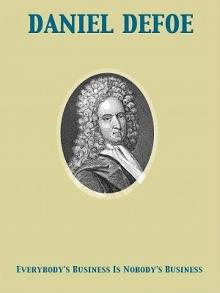 Everybody's Business Is Nobody's Business
Everybody's Business Is Nobody's Business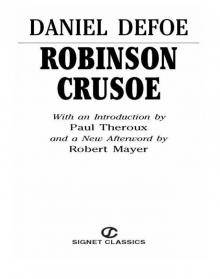 Robinson Crusoe
Robinson Crusoe The Storm
The Storm The King of Pirates
The King of Pirates History of the Plague in London
History of the Plague in London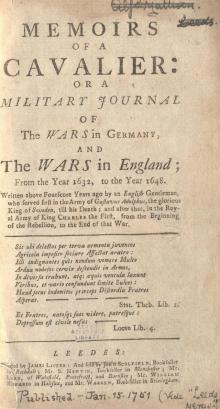 Memoirs of a Cavalier
Memoirs of a Cavalier_preview.jpg) The Life and Most Surprising Adventures of Robinson Crusoe, of York, Mariner (1801)
The Life and Most Surprising Adventures of Robinson Crusoe, of York, Mariner (1801)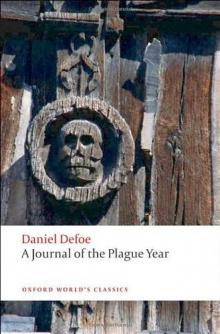 A Journal of the Plague Year
A Journal of the Plague Year_preview.jpg) The Life and Adventures of Robinson Crusoe (1808)
The Life and Adventures of Robinson Crusoe (1808)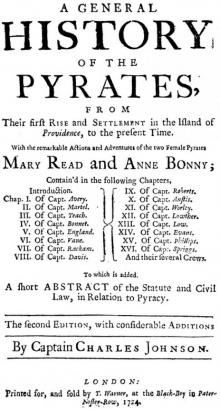 A General History of the Pyrates: / from their first rise and settlement in the island of Providence, to the present time
A General History of the Pyrates: / from their first rise and settlement in the island of Providence, to the present time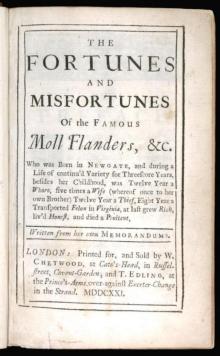 The Fortunes and Misfortunes of the Famous Moll Flanders
The Fortunes and Misfortunes of the Famous Moll Flanders_preview.jpg) The Fortunate Mistress (Parts 1 and 2)
The Fortunate Mistress (Parts 1 and 2)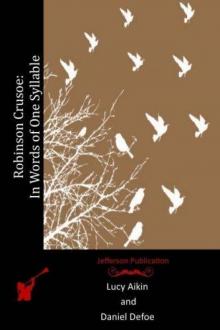 Robinson Crusoe — in Words of One Syllable
Robinson Crusoe — in Words of One Syllable From London to Land's End
From London to Land's End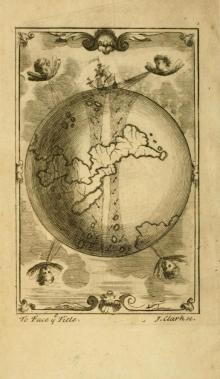 A New Voyage Round the World by a Course Never Sailed Before
A New Voyage Round the World by a Course Never Sailed Before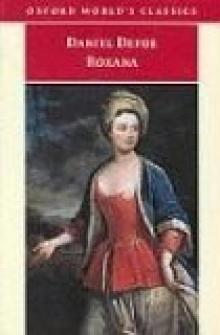 Roxana
Roxana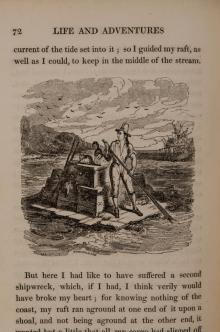 The Life and Adventures of Robinson Crusoe of York, Mariner, Volume 1
The Life and Adventures of Robinson Crusoe of York, Mariner, Volume 1_preview.jpg) Memoirs of Major Alexander Ramkins (1718)
Memoirs of Major Alexander Ramkins (1718) Dickory Cronke
Dickory Cronke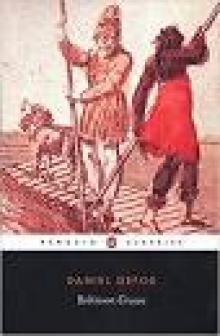 Robinson Crusoe (Penguin ed.)
Robinson Crusoe (Penguin ed.) Moll Flanders
Moll Flanders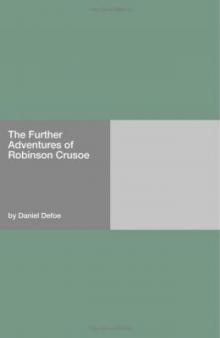 The Further Adventures of Robinson Crusoe rc-2
The Further Adventures of Robinson Crusoe rc-2